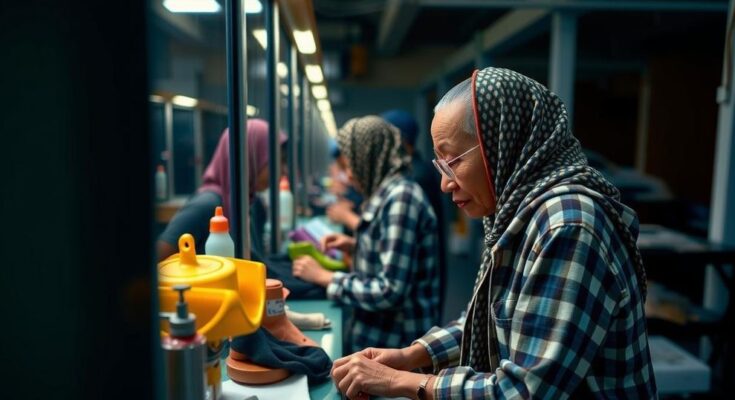IndustriALL Global Union has filed complaints against Next, New Yorker, and LPP for labor rights violations in Myanmar. These brands continue operations despite evidence of exploitation under military rule. Calls for withdrawal echo as abuses mount, with organizations urging ethical business practices in the face of ongoing human rights violations.
IndustriALL Global Union has initiated formal complaints against prominent garment brands—Next, New Yorker, and LPP—at the OECD’s National Contact Points across several European nations. This bold action highlights a stark reality: despite mounting evidence of egregious labor rights violations under Myanmar’s military regime, these brands persist in their operations, reaping profits from a system devoid of human rights and dignity for workers. Joined by the banned unions of Myanmar, CTUM and IWFM, IndustriALL contends that these companies have flouted the OECD Guidelines for Multinational Enterprises, which mandate ethical practices. “Brands that stay in Myanmar are benefiting from an environment of fear, forced labour, and exploitation,” stated IndustriALL’s general secretary Atle Høie, illustrating a chilling picture of the working conditions faced by garment workers in the country. Myanmar’s tumultuous political landscape has transformed its textile industry into a financial lifeline for the ruling military, yet this comes at a horrific cost. The junta has systematically dismantled unions, instilled terror among labor leaders, and reported numerous instances of forced labor and severe wage repression. A tracker maintained by the Business & Human Rights Resource Centre has captured an alarming 556 reports of labor and human rights abuses linked to 266 factories as of June. IndustriALL calls for an ethical exit by multinational companies from Myanmar, arguing that their presence exacerbates human rights violations. IWFM president Khaing Zar Aung emphasized the irony of brands that profess adherence to international principles, stating, “The brands pretend they comply with the OECD guidelines and human rights due diligence, which is impossible under a military dictatorship.” In response to these troubling conditions, IndustriALL has urged brands to disengage responsibly from Myanmar. Many have already begun this process, including notable names like Primark and H&M, who have committed to a responsible business disengagement framework. Amidst conclusions drawn from various inquiries into systemic abuses, Høie warned of severe implications for brands still operating in Myanmar, saying that ignorance of such abuses is no longer viable. “We are considering filing further complaints regarding other brands that remain,” he added, suggesting that the fight for labor rights is far from over.
The textile and garment industry in Myanmar is currently at a crossroads, ensnared in a web of political turmoil and human rights violations. Following the military coup, reports of rampant labor exploitation, including forced labor and the banning of unions, emerged, putting pressure on international brands operating in the region. Despite extensive documentation of these issues, many major companies continue their operations, prompting organizations like IndustriALL to take action to hold them accountable and advocate for the rights of Myanmar’s workers.
The situation in Myanmar’s garment industry epitomizes a tragic clash between corporate profit and the fundamental rights of workers. With multiple international complaints lodged against major brands, it is clear that the cry for justice within the garment sector is growing louder. As companies grapple with their ethical responsibilities, the call for a concerted withdrawal from a repressive regime becomes not just a necessity but a moral imperative. The future of Myanmar’s workers hangs delicately as the struggle for their rights persists against a backdrop of greed and exploitation.
Original Source: www.industriall-union.org



